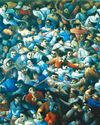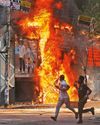
FINDING Mohandas Karamchand Gandhi or someone sharing his political and cultural sensibilities is not easy today. In his homeland, it can even be hazardous.
India's Second Republic sees the admirers of Gandhi as self-indulgent, romantic peaceniks or traitors conspiring to stall the country's journey towards its inescapable destiny: being another neat example of what the late activist-scholar Herbert Feith used to call repressive, developmentalist regimes. This is a well-known syndrome in East and Southeast Asia and in South America, where a quicker pace of development—sometimes even glossy pronouncements on a free market economy and future development—becomes a full justification for an authoritarian state.1
Politically, this syndrome seeks support from populism and masculine nationalism, near-total control of media and blatant crony capitalism. Psychologically, it thrives on cultivated paranoia, a streak of narcissism, and psychopathy in the upper echelons of politics. A few decades ago, this syndrome—let us call it Feith's demon—entered South Asia and has already left the democracies in the region tottering. More recently, after seriously injuring the world's most powerful democracy, it is trying to subvert the world's largest democracy.
This story is from the January 21, 2025 edition of Outlook.
Start your 7-day Magzter GOLD free trial to access thousands of curated premium stories, and 9,000+ magazines and newspapers.
Already a subscriber ? Sign In
This story is from the January 21, 2025 edition of Outlook.
Start your 7-day Magzter GOLD free trial to access thousands of curated premium stories, and 9,000+ magazines and newspapers.
Already a subscriber? Sign In

Nomadland
All eyes are on President-elect Donald Trump and his policy on immigration

Far from Home
We have forgotten the plight of Afghans who fled to India, and continue to suffer

Bang Bang That Awful Sound
What happens when we listen closely to the soundscape of war?

Refugee Dilemma
For most Indian-origin Sri Lankan Tamils, who are victims of ethnic conflict and civil war, proving that they are not illegal migrants is a nearly impossible task

They Poured Fire on Us
The resilience of refugee women from Sudan, Ethiopia and Yemen in the face of war and displacement is remarkable

The Sound and the Fury
Iraqi poet, novelist, translator and scholar Sinan Antoon was born and raised in Baghdad.

The Day I Became a Woman
In a country where authorities have been directly engaging in the gruesome war against women for decades, artists like Nahid Hassanzadeh stand apart as a voice of dissent–a haunting reminder of the unwavering spirit of the rebellious Iranian women fighting against the Islamic Republic’s violent crackdown.

The Kite Runner
The official figure of civilian deaths in Afghanistan is a serious underestimate. It is unlikely that we will ever know the real cost of Afghan lives

American Patriot
Barring a few exceptions, Hollywood movies continue to be gung-ho about the United States' penchant for waging wars across the globe

The Hunters
How can Bangladesh's fractured society, burdened by layers of trauma, begin to heal?
